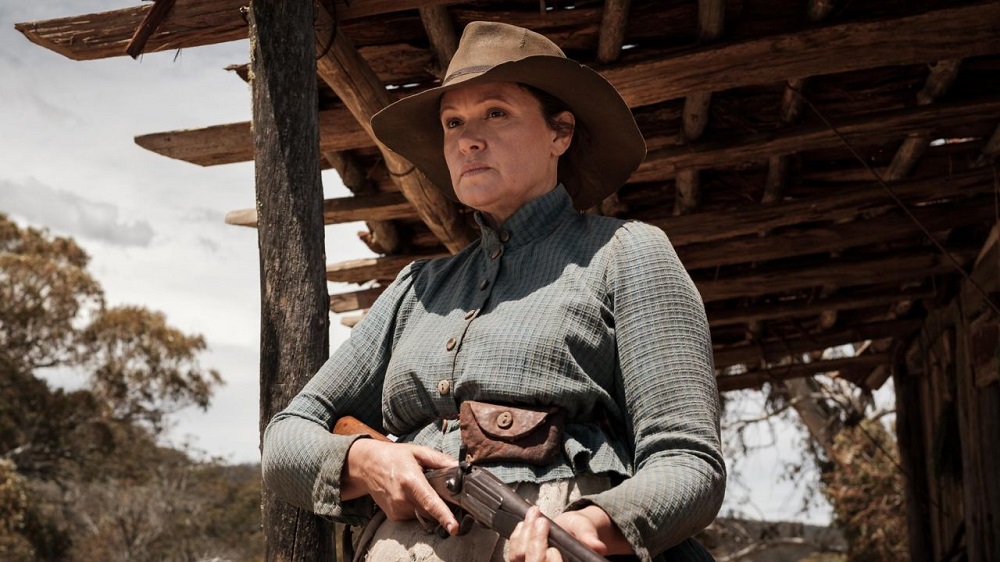
The Legend of Molly Johnson
2022, NR, 109 min. Directed by Leah Purcell. Starring Leah Purcell, Rob Collins, Jessica De Gouw, Sam Reid, Gregg Arthur, Craig Bourke, Tony Cogin.
REVIEWED By Lina Fisher, Fri., Aug. 19, 2022
The Legend of Molly Johnson is not an easy watch. Adapted from Henry Lawson's 1892 tale "The Drover's Wife," it’s an epic by short story standards, about a woman protecting her children on the Australian frontier while her husband’s off droving cattle – replete with the requisite daily tragedies of the genre.
For the first half of the film, it plays like a classic Western, with a cast of recognizable archetypes: the “good” cop and bumbling sidekick, the misunderstood fugitive, the spunky young wife. One exception is the well-drawn Molly herself, played subtly and with heartbreaking emotional control by director Leah Purcell. Unfortunately, the story drags for the first half of the film, and the downright cheesy score and ending song disrupt scenes that could have carried the emotional weight better on their own.
But it’s the arrival of an Indigenous fugitive, Yadaka (Collins), into Molly’s life that radically shifts the context of the narrative and makes it more than a typical frontier thriller. In the second half, the film finds its stride and reveals its true colors as a study of Indigenous female identity in late 1800s Australia. Thematic undercurrents of sexism and racism come to the surface as the parallels between Molly’s life and the injustices of our modern world become apparent, no doubt informed by Purcell’s own experience.
Sometimes that comparison feels anachronistic or heavy-handed, like when Yadaka tells Molly his only crime was “existing while Black.” Yet other times Purcell’s commentary hits like a sucker punch. The well-meaning proto-suffragist wife (De Gouw) of the new-to-town sergeant (Reid) writes a newsletter advocating for battered women’s rights; she thinks she’s “giving women a voice!” Molly, who’s lived that experience, responds, “I could only hear you.” From the confines of a literal jail cell that the activist’s husband put her in, Molly tells her, “You write from the outside.” That couple exemplifies the gamut of modern activism’s sins: at best, well-meaning but out of touch; at worst, doing lip service but really an active part of institutional oppression and preserving the status quo.
The ending attempts some kind of hope, but as a whole the film leaves a bitter taste. No matter how inspiring Molly’s character is, we see hegemonic violence playing out in the same ways today. But there’s a reason Purcell has adapted this story three times; it’s rife with material to mine on the subtler aspects of bigotry, white-passing, law enforcement, and white feminism that are always worth exploring, even and especially if they will never be resolved.
Read our interview with director/star Leah Purcell, "Leah Purcell Writes and Rights History in The Drover's Wife," March 18, 2021.
A note to readers: Bold and uncensored, The Austin Chronicle has been Austin’s independent news source for over 40 years, expressing the community’s political and environmental concerns and supporting its active cultural scene. Now more than ever, we need your support to continue supplying Austin with independent, free press. If real news is important to you, please consider making a donation of $5, $10 or whatever you can afford, to help keep our journalism on stands.
Richard Whittaker, March 22, 2024
Marjorie Baumgarten, June 1, 2007
May 30, 2025
May 23, 2025
The Legend of Molly Johnson, Leah Purcell, Leah Purcell, Rob Collins, Jessica De Gouw, Sam Reid, Gregg Arthur, Craig Bourke, Tony Cogin









